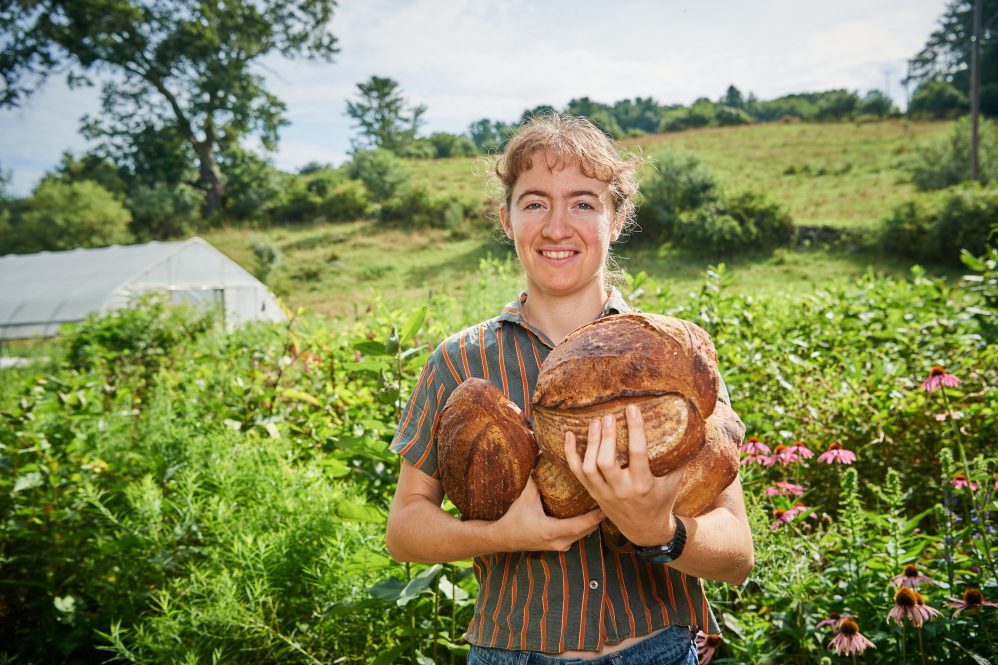Food is essential. In fact, food is life, and all life is food.
From our human perspective, food is often enjoyable. It’s often a part of shared community with others. And for many, and in particular those who work in the food system, it’s often scarce.
The intersection of the myriad aspects of food, and how we as individuals and as communities interact with food systems, is the focus of one interdisciplinary UConn program that has been engaging cohorts of undergraduates to think outside the box – and outside the classroom – when it comes to food production, sustainability, accessibility, and justice.
“Sustainable Community Food Systems is a unique minor within Environmental Studies that enables us as faculty and staff to fully embody what we think being a public land grant institution of higher education means,” says Julia Yakovich, UConn’s director of service learning, who has been involved with the program since the beginning.
“Sustainable Community Food Systems provides motivated undergraduates with hands-on experiences in the community around issues of food, sustainability, and social justice,” says program co-founder and advisor Andrew Jolly-Ballantine, an associate professor-in-residence with UConn’s Department of Geography. “We designed the SCFS minor with the intent of providing UConn students with the kind of deep learning experience that is usually seen in small, liberal arts co-op or thesis programs.”
Now in its fourth year, the minor includes a core set of classes as well as a capstone thesis required of all participants, and the heart of SCFS is its dedicated team of faculty and mentors, including Phoebe Godfrey in Sociology; Kristina Wagstrom in Chemical Engineering; Jennifer Cushman in UConn Extension; and, until recently, Julia Cartibiano, former manager of Spring Valley Student Farm.
But the heart of the SCFS curriculum is its internship – an intensive experience, 16 to 20 hours per week, with a single community partner that is involved in the food system.
“Learning by doing is essential for what we understand as authentic learning, while also engaging in extensive reflection and critical analysis so that students repeatedly engage in both theory and praxis,” says Godfrey, an advisor and co-founder of the program.
Some students work on farms, both urban and rural. Others partner with social justice organizations or help build and maintain community gardens. Some focus on developing business concepts that seek to fulfill unmet food needs in local communities. And still others work on environmental advocacy efforts to protect clean food and water sources.
In all, Sustainable Community Food Systems participants complete a staggering 450 hours of paid and credit-bearing internship over the course of their involvement in the program.
“Each SCFS Fellow works on a farm or at a community garden throughout the growing season, while also working with a community partner on projects that range from sustainable farming practices to distribution of fresh produce to families in need to education of youth about farming, nutrition, and equity in food access within their communities,” Jolly-Ballantine says, “giving them a much deeper experience that brings them closer to the community than the traditional internship.”
It’s that experience, combined with a full offering of service learning courses, that facilitates the goals of Life-Transformative Education in ways that are authentic and meaningful to the community as well as students and faculty, says Yakovich.
“Service Learning also enables the content of the program to transition easily to writing grants and conducting research as the partners, students, and faculty deem necessary and relevant as we move through time and space with the minor in lockstep with the needs of the community,” she says, “which translates to the needs of our own UConn community as well, because food and sustainability is for everyone.”
While SCFS is still relatively new at UConn, support for the program is growing – initial cohorts of three to six students are expected to expand to as many as 13 over the next few years, as student interest, funding, and faculty support from across the University continue to increase.
“The potential of the SCFS program for making change around Connecticut is huge,” Jolly-Ballantine says. “This model of Life-Transformative Education touches the faculty and staff of the program, the undergraduates, and members of the community at all ages.”
“It is our hope that, as more students become aware of SCFS and see that it offers not only unique learning experiences, but that it also offers students the potential for meaningful careers, that will help to address our most pressing social and environmental problems – as in, how we will live and eat on this one planet together as one species among millions of others and do so equitably, peacefully and sustainably,” says Godfrey. “These are issues that more and more students want to address and that we as a campus, as a society, and as a species must address together and now.”
The Breadmaker
At any given time, Jessica Larkin-Wells ’19 (CLAS) might have over 100 pounds of flour stored in her basement.
A lot of it comes from Maine Grains, a producer focused on freshly milled, organic, and heritage grains sourced from the Northeast, and on many a Saturday night, late into the evening, you’ll find Larkin-Wells and her boyfriend ferrying the doughs made with those flours to a pizza shop in Guilford that’s just closed up for the weekend.
“It’s becoming routine now,” she says. “On Saturday night, we rake the coals in the oven to spread them evenly across the oven floor, and then close the door. Because it’s wood-fired, and because it’s a very well insulated oven, it maintains its heat the next day, so we don’t have to add any energy input, it’s just already hot and ready for bread.”
Overnight, the 900-degree pizza oven will slowly begin to cool, and the temperature within will become more even. On Sunday morning, after sweeping out the burned-down embers and ash, the oven will be mopped with water – both to clean it and to further cool it down, Larkin-Wells explains – and then it’s time for baking.
“When it’s the right temperature, and when we’re ready to bake our bread, we load it all up, and try to fill it as tightly as possible,” she says, “because the more bread that’s inside, the more steam will be trapped inside the oven.”
That steam is important in building the crispy outer crust of well-baked bread, as well as forming the loaf’s “ear” – the ridge that opens up as the bread expands in the steamy heat of the oven.
“I have high standards for what bread should look like,” says Larkin-Wells, who prefers to bake naturally leavened bread, what’s commonly known as sourdough. “Wild yeast is kind of hard to purchase, it’s not super available to people, so it feels really special that I can give it to people.”
While Larkin-Wells lived and worked at Spring Valley Student Farm as an undergraduate, she turned to bread – rather than farming – as her focus for the Sustainable Community Food Systems minor. The sociology major had been baking with her mother since she was little, she says, but UConn’s program offered the opportunity to dive deeply into the history, art, and science of breadmaking.
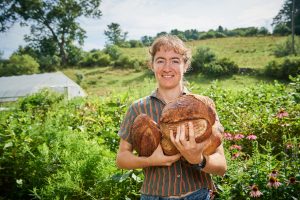
“I think it came out of family tradition, just the general way we do it in my family,” she says of her interest in breadmaking. “We share food with people, and that’s how we express our love and caring.”
For her internship, Larkin-Wells worked at Atticus – a New Haven institution – and learned the ins and outs of fermentation, mixing, proofing, and ultimately baking different types of bread. The bakers at Atticus, especially head baker Josh Kanter, were incredibly supportive of her, she says, taking her from zero knowledge to the skill she owns today.
“Now, I can make bread that pretty much everybody loves,” she says. “When I can make a really big loaf of bread for a group of people and know that it’s all going to get eaten that day, it’s all going to get eaten fresh – that’s my favorite kind of bread to make.”
The skills learned from breadmaking, she says, go far beyond forming loaves. Much like farming, breadmaking has taught her to be “infinitely attentive” to what she’s doing and the world around her.
“When I was baking professionally, and also now as I’ve been doing it at home, it’s interactive in a way that it seems many things aren’t in our current culture, in that you have to pay a lot of attention to the dough,” says Larkin-Wells. “This sounds so silly, but you can learn to observe it and sense it in different ways – to smell it and watch it over time, and know what has happened to it, and how it will behave in the future, and what you should do with it. At first you don’t even know. But then you learn that the way that looks is over proofed. The way it’s flattened out like that, or the way that the edges are curved up at the bottom – that means it was under proofed and didn’t get a chance to open, or it didn’t get enough steam.”
She continues, “Farming is the same way, where you can be infinitely attentive to the plants and the soil and the weather, and the more experience you have, the more information you’re able to receive from your environment. I think that’s just the natural way of being for humans – to be really attentive to your environment – and it’s hard when you don’t know that much, but the more you learn, the more enjoyable it becomes.”
Recently, Larkin-Wells has returned to Spring Valley Student Farm, this time serving as its interim farm manager, an opportunity she calls “a dream.” But on the weekends, she’s baking at the pizza shop, prepping the oven on Saturday nights – often making whole wheat pita bread first, while the oven is still at its peak temperature.
“Pita is something that you can’t even make in a home oven, really,” she says, “because it doesn’t get hot enough.”
And then on Sundays, a gathering of people in the know – friends, family, customers of the pizza shop, and others who have learned about the bread along the way – come to the shop to purchase the 40 or so just-baked loaves while the bread is fresh and soft and warm. The proceeds help to cover costs and keep the weekend breadmaking going.
Without Sustainable Community Food Systems, Larkin-Wells says she would not have been able to make time to study bread and acquire her skill, and that the push to dive deeply into something is an important part of the program.
“For the academic and the practical to be united in that way, and for both to be valued in the school setting, is just really wonderful,” she says. “This is something where, if you have the bandwidth to be really curious about something, and to adapt your plans to what you’re learning and what your questions are, then it’s a fantastic opportunity.”
The Educator
This coming February, Chloe Murphy ’21 (CLAS) will travel to Brazil on an English teaching assistantship through the prestigious Fulbright Student Award Program.
She plans to attend graduate school when she returns, with the goal of first becoming a history teacher in an urban setting, and later an education administrator.
But Murphy, who majored in Africana Studies, was already an educator long before beginning her studies at UConn.
“I’ve been working with F.R.E.S.H. New London, which is a food justice organization, for eight years,” she explains.
F.R.E.S.H. New London is a nonprofit organization devoted to “empowering youth, connecting community, and growing food to dismantle systemic oppression and build food sovereignty” in the southeastern Connecticut city. F.R.E.S.H. establishes and maintains community gardens and “snack beds” – where people can find fresh-growing vegetables available to them in spots around the city – and hosts year-round programming and conducts workshops on topics including agribusiness, capitalism, and food justice.
For a large amount of her time with F.R.E.S.H., Murphy has served as the nonprofit’s food justice educator, teaching community members about agriculture, food systems, and food access. She’s recently also taken on the role of the organization’s director of youth programming – managing agricultural and food justice programs for mostly high school students from the ages of 14 to 18 in New London.
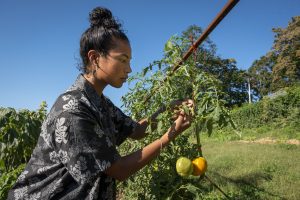
For Murphy, the Sustainable Community Food Systems minor at UConn offered an opportunity to continue her work with urban agriculture and community empowerment while experiencing how other organizations and cities are tackling the same issues.
“What interested me was the hands-on component of it, the really personalized education where you could make a lot of decisions for yourself about how you were going to engage with the content,” she says. “But also, this is my area of work, and most of my education in this field has come through my work back home. So, there’s still an opportunity to learn from different perspectives and from different resources. And if it’s something I care about, why not dive deeper into it?”
For her internship, Murphy worked with the Keney Park Sustainability Project in Hartford, assisting there with agricultural and programmatic work.
“I always love visiting different urban agriculture initiatives and just seeing how they do things differently from us or if they do things similarly from us,” she says. “Just being in the space and taking it in and spending time there and building connections with folks was the best part.”
She says the experience gave her different perspectives to pull from when writing her own programming. It’s important work, she says, because of the impact that it can have, particularly in communities that have historically been marginalized.
“There’s no way to talk about food injustice without also talking about environmental racism, labor exploitation, the wealth gap, and the history of housing and housing access in the United States,” says Murphy, who learned about the concept of “food apartheid” from the author, educator, and food justice activist Leah Penniman of Soul Fire Farm.
“The term is ‘food apartheid,’ rather than a ‘food desert,’ because a desert is a naturally occurring landscape,” she says. “But if we use the term ‘apartheid,’ we understand that this is really a political design. It just doesn’t naturally happen that low-income, people of color, Black, and Indigenous people are experiencing food apartheid at higher rates than any other groups. It’s by design because of all these other interlocking systems that have disadvantaged our communities for generations.”
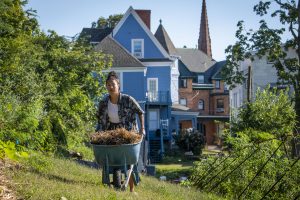
She explains that just because neighborhoods have grocery stores does not mean that people living in those communities have access to affordable, nutritious, and culturally appropriate food, because barriers – including logistical, transportation, financial, and health barriers – can prevent access.
“I know a woman whose child has lead poisoning, and he can’t eat anything but organic fruits and vegetables, which we know tend to be very expensive at grocery stores,” Murphy says. “So that’s how she got into the food justice movement, because she’s like, ‘I need to be able to just grow my own food for my son, because I can’t pay for it at the grocery story sustainably.’”
She says the answer to food apartheid is food justice, which encourages community empowerment, community engagement, and the ability of families to make decisions about the food that they will eat.
“This work is important because people are important, our communities are important,” Murphy says, “and they deserve to eat healthy. They deserve to make decisions about how they’re going to live. We shouldn’t just be at the mercy of big systems that disenfranchise our communities. We should be empowered to make decisions about our lifestyles and about what our communities are going to look like.”
The Farmer
Lauren Haff might someday become a vocational agriculture teacher.
Or, she might end up spending her winters farming in Puerto Rico.
But today, you’ll likely find her in Mansfield in the early morning hours, working a quarter-acre of land right on Route 32 that hasn’t been farmed in decades, growing vegetables – something she’s never done before.
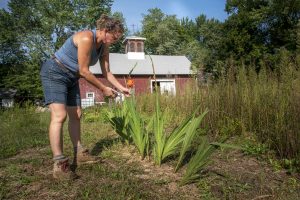
“I am an heirloom cut flower grower,” Haff says. “I only do heirlooms. That’s my thing, antique flowers. But caring so much about food, I wanted to get local food to local people.”
Intermixed with the snapdragons and zinnias and sunflowers and dahlias are rows of melons and kale, tomatoes, cucumbers, hot peppers, and other vegetables, which Haff tends on her own and waters by hand in the shadow of the historic Merrow barn – there’s no irrigation or infrastructure to support the effort, and the work is hard.
But the mother of two adult daughters is toiling on this small parcel with the hope of achieving some very big goals.
“I want to get healthy, nutritious food to local people,” says Haff, who notes that she’s been in the farming community off and on for 25 years. Her business is a social enterprise, she says – a successful business that also works for social good – and she’s focusing her effort in one rural community in particular that isn’t always recognized as being in need of access to local food.
“When I was married I lived in Stafford,” says Haff. “Both my daughters graduated from Stafford High. It holds a place close to my heart. I’ve been working with the town of Stafford, and I want to get local produce or products from local farmers to Stafford.”
Haff says that the elderly, homebound, and other adults and families without sufficient transportation options often struggle to find good food options in the community. There’s no public transit, few markets, and the local co-op closed down.
It’s a project she began working on while taking part in the Sustainable Community Food Systems minor, and it’s now a part of her company, Vintage Blooms. But the minor offers much more than just the tools to become a farmer, she says.
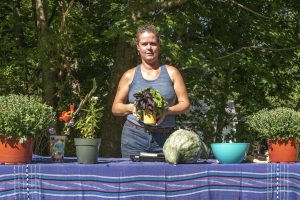
“It’s not only about this,” she says, gesturing to the rows of crops in her field. “It can be about policy, sociology, nutrition. To me, it was getting local food to local people, and it teaches you about sustainable local food in all aspects. Whether you’re doing social justice work, whether you’re doing the environmental part of it, it helps you narrow down where you want to work in sustainable community food.”
Haff does gardening and landscaping jobs through her company to support herself and her farm work, and starts all of her plantings on campus through an arrangement with the UConn greenhouses. She’s just been awarded a $25,000 grant from the USDA, which she plans to use to construct a hoop house and add an irrigation system to her farm space.
A geography major who is still working on completing her degree following lengthy illness in her senior year, Haff is full of ideas – she’d like to find a 1950’s Chevy to move her produce, or rent a space in downtown Stafford where local residents could come to get fresh food. She’s also planning for a farm stand on her Merrow Road plot to help fund the operation.
The Future Lawyer
Taryn Crossley ’24 (CANHR) didn’t grow up farming – she had never spent her days growing food, managing plants, or dealing with the endless persistence of weeds.
“The weeding never stops, does it?” the environmental studies major asks.
But Crossley, who began her sophomore year this fall, wants to be an environmental lawyer and has a strong interest in food regulation. When she saw a flyer in her residence hall for an informational Zoom session about the Sustainable Community Food Systems program, Crossley jumped at the chance. After that Zoom, she was sold.
“I liked that there was an internship that was one of the programs requirements,” she says, “and I liked how it was working on a farm, because I hadn’t done that before and it seemed interesting to me.”
Crossley set up her internship this past summer at Ox Hollow Farm in Roxbury, which is close to her home in Bridgewater. She started working at the farm after the spring semester, as soon as she had completed her finals, and while she originally had planned to only work there a few days a week, the arrangement soon evolved into a Monday through Friday, 8:00 a.m. to 5:00 p.m. gig.
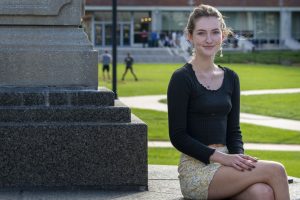
“It just became apparent to me that they needed help – they needed people to be there at the farm and to be doing work,” she says. “It kind of just took on a role of itself, and it was a big commitment, but it was really good work, and if you have good coworkers, it makes it worth it.”
Crossley spent her days at the farm planting, transplanting, and harvesting, marveling at the speed at which plants would grow and start to become productive, but also the commitment needed to endure the constant challenges that farming presents.
“When I walked away from the internship, I just kept thinking that my bosses must really love this, because it’s really hard work and it takes a lot of patience,” she says. “This past season, it was really hard, because there was so much rain. Everything was just really moist, and things rotted a whole lot faster than they were supposed to. So, it was really tough this past season, but they’re all gas, no brakes.”
She also helped the farm by working at farmers markets in Fairfield County on Wednesdays, and the experience of attending the markets was as eye-opening for her.
“Our clientele was basically just one class – not everyone has access to these foods,” she says. “Farming is hard work, and it’s expensive. You usually have many workers working long hours, so the owners of a farm usually have a lot of financial strain, and then with the weather, there are some crops that get that get ruined, and so you pay the premium price for fresh local food. And it’s unfortunate that not everyone has the funds to be able to purchase those types of foods.”
That critique of the food system is a lesson she’s taken with her since completing her internship, and while the experience has further fueled her desire to work in food regulation, don’t expect to find her working fields in the future.
“I don’t think I could be a farmer – it’s really hard, and it’s soul-nourishing, I will say, but just not for me,” Crossley says. “Growing up, I was very privileged in that food would show up on my plate, and I didn’t really understand where that food came from, or the hard work that it takes to keep a farm. There’s so many different elements that go into it that I had never even thought of, and now that I’m aware of it, it makes me think more consciously about where I’m buying from and the food that I am eating.”
Sustainable Community Food Systems is about more than just farming, though, which explains why its interdisciplinary approach appeals to an aspiring lawyer like Crossley.
“My mom is a teacher, and it’s so important for people in the education system that, at some point, they are teachers,” she says. “I think it’s the same thing with making food regulation, and if you’re in any way involved in the food system in a legal manner, you should have experience on a farm, in all the elements of a farm.”
For more information about Sustainable Community Food Systems at UConn, visit scfs.environment.uconn.edu. For more information about Service Learning initiatives and opportunities at UConn, visit sl.engagement.uconn.edu.
